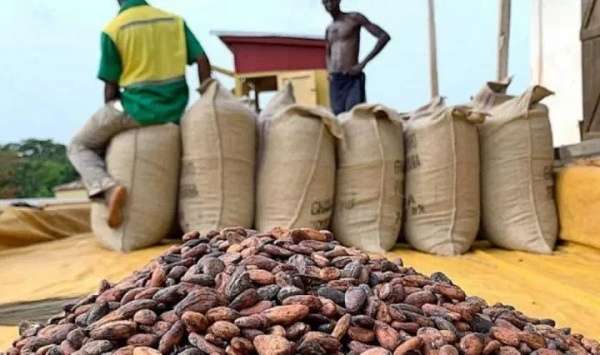Cocoa production in major West African countries continued to face headwinds as of the first month of the third quarter of 2022 after a significant drop since the end of December last year, according to the latest figures from the International Cocoa Organization (ICCO).
The ICCO reported that volumes of cocoa purchases in Ghana plummeted by 32% year-on-year in July 2022 to 651,000 tonnes.
Likewise, the ICCO highlighted that cocoa arrivals in Côte d’Ivoire were reported at 1.943 million tonnes, down by 5% compared to the level of 2.045 million tonnes seen at the same period of the previous season.
“In Ghana, the latest available information indicated that volumes of cocoa purchases were lower by 32% year-on-year from 961,000 tonnes to 651,000 tonnes. During the last week of the month under review, the adequate meteorological conditions that prevailed in West Africa erased concerns regarding cocoa supply. Hence, the JUL-22 contract prices plunged by 4% on both markets moving from US$2,138 to US$2,062 per tonne and from US$2,376 to US$2,291 per tonne in London and New York respectively”.
ICCO
The ICCO disclosed in its Cocoa Market Report for July 2022 that during the first half of the month under review, the front-month cocoa futures prices plummeted by 6% from US$2,212 to US$2,069 per tonne in London and by 8% from US$2,522 to US$2,329 per tonne in New York.

“This bearish trend in prices was driven by the strengthening of the US dollar, global economic concerns mainly stemming from steady inflation and a high level of inventories in the Exchange monitored stocks of cocoa beans. Certified stocks of cocoa beans increased from 171,330 tonnes to 176,740 tonnes in Europe and from 352,106 tonnes to 357,894 tonnes in the United States”.
ICCO
Thereafter, information that volumes of arrivals in Côte d’Ivoire and purchases in Ghana continued to be lower year-on-year, contributed to the short-lived upward trend seen in the JUL-22 prices over the 1-week period 16-22 June, the ICCO stated.
Evolution Of Weather Parameters In Côte d’Ivoire And Ghana
The average temperature (in degree Celsius), the cumulative rainfall (in millimetres), and the average soil moisture (mm in top 0-1-6m soil), compiled from the weather database of Refinitiv for the cocoa growing areas in Côte d’Ivoire and Ghana, showed that the trend for the current cocoa year and the two previous seasons are nearly similar.
This evidence suggests that the current low level of arrivals and purchases in both countries are not necessarily attributable to the weather. As no bottleneck in the haulage of cocoa upcountry has been reported, other parameters like aging cocoa trees or cocoa-related diseases as well as poor agricultural practices could have contributed to reducing the yield of cocoa farms and subsequently lowering the level of arrivals and purchases in Côte d’Ivoire and Ghana respectively, the ICCO explained.
Performance of main regional cocoa associations
Data published by the main regional cocoa associations indicated an increase in grindings in Q2, 2022 in Europe and South-East Asia, whereas the inverse situation was observed in North America.
The European Cocoa Association (ECA) reported that grindings increased in Europe by 2.03% year-on-year to reach 364,081 tonnes in Q2, 2022. Nevertheless, the ICCO warned that these results should be interpreted with caution because expectations of rising energy might have led grinders to process now and stockpile products for the future.
In South-East Asia, the Cocoa Association of Asia (CAA) released data showing that cocoa processing activities in the region increased by 3.64% to 228,895 tonnes in Q2, 2022 compared with 220,865 tonnes in Q2, 2021.
On the contrary, the National Confectioners’ Association (NCA) reported a year-on-year quarterly decline of 6.29% in cocoa processing. This amounted to 115,899 tonnes against 123,680 tonnes recorded during the second quarter of 2021.
Currently, the overall increase in the cocoa demand and the anticipated supply deficit for the 2021/22 season do not seem to be sufficient to counterbalance the effects of the current macroeconomic parameters, the ICCO stated in its current report.
READ ALSO: Security Personnel Trained On Migration Management & Rights Of Migrants



















